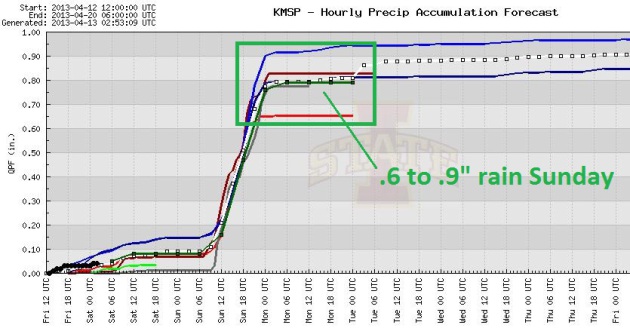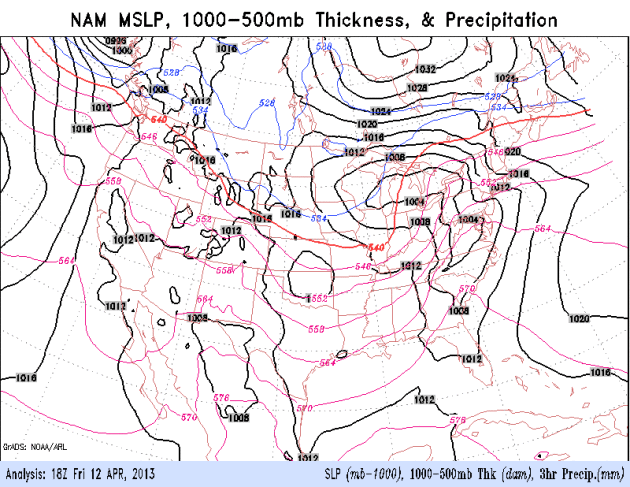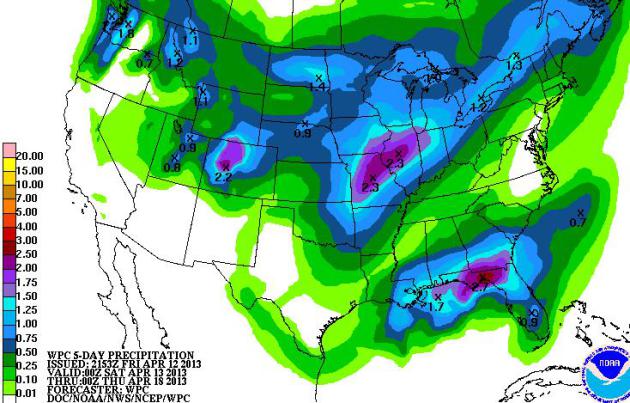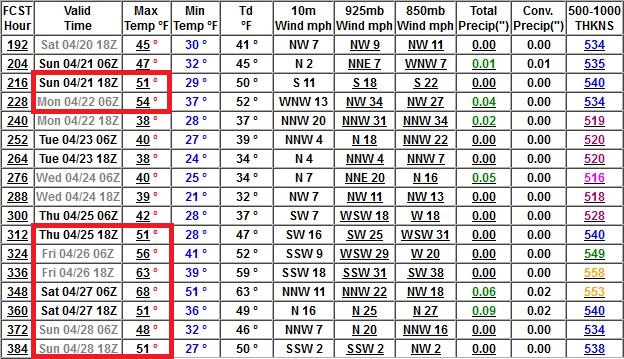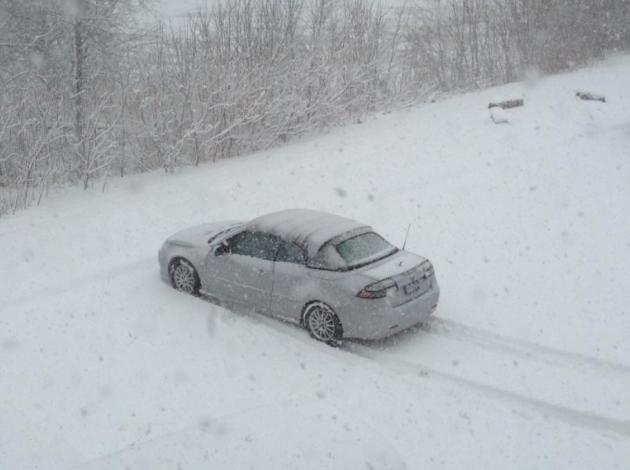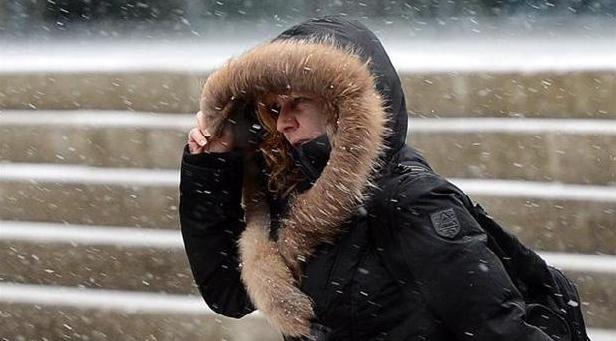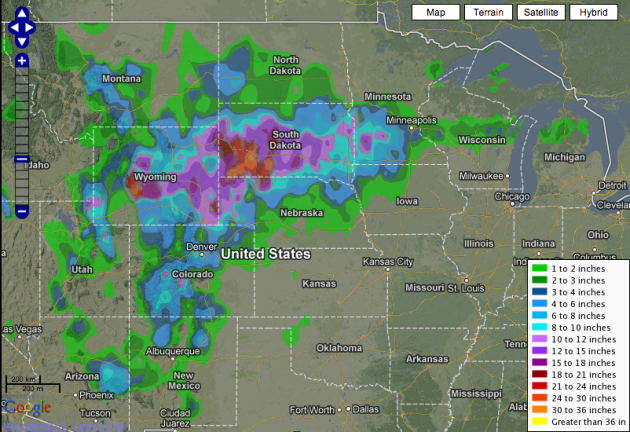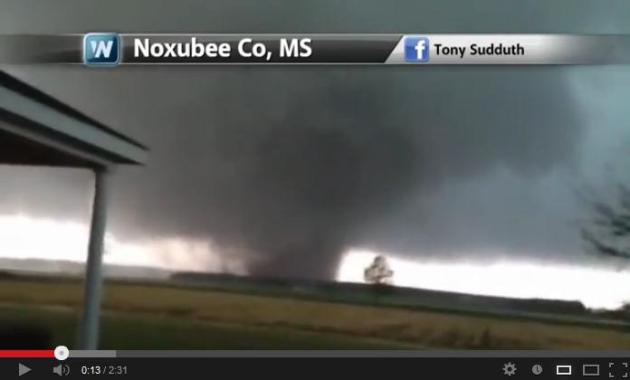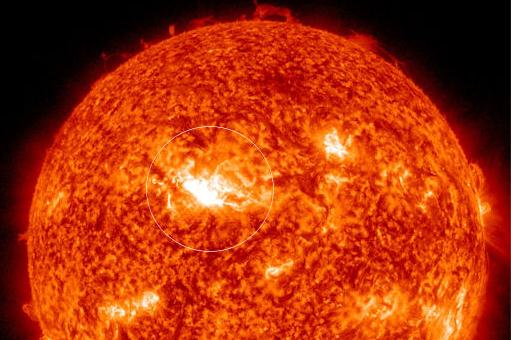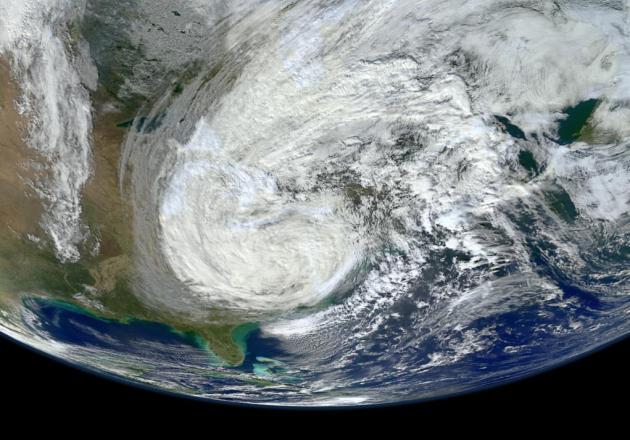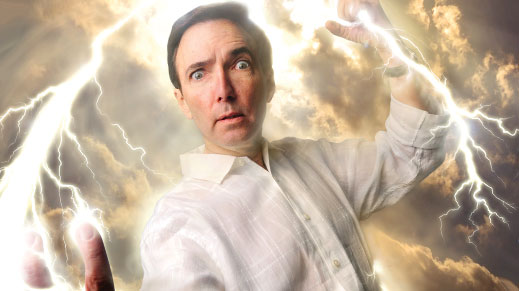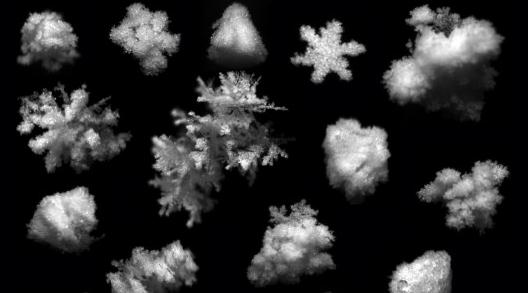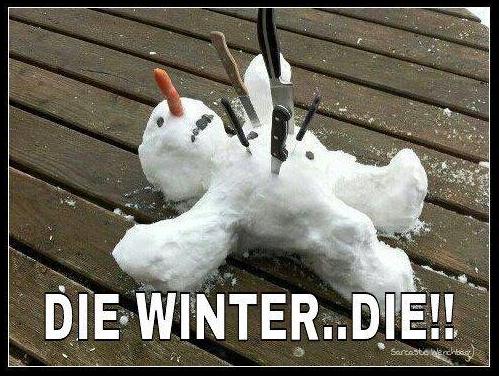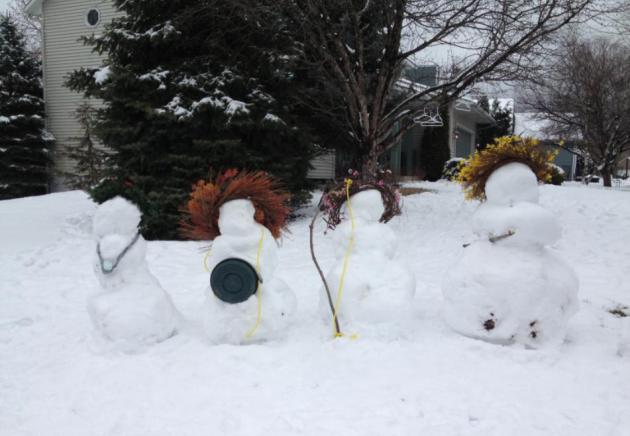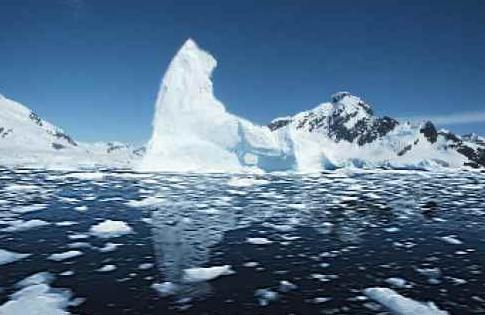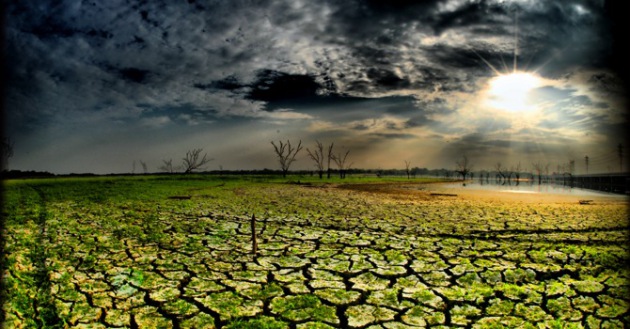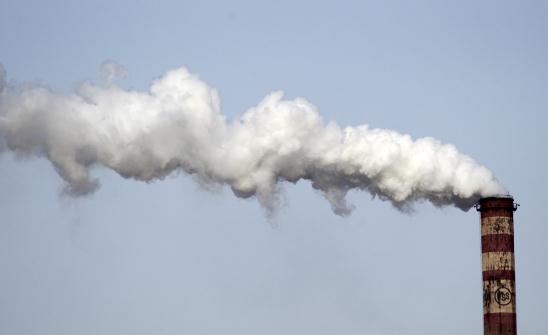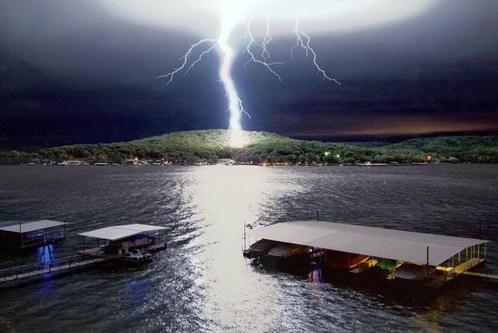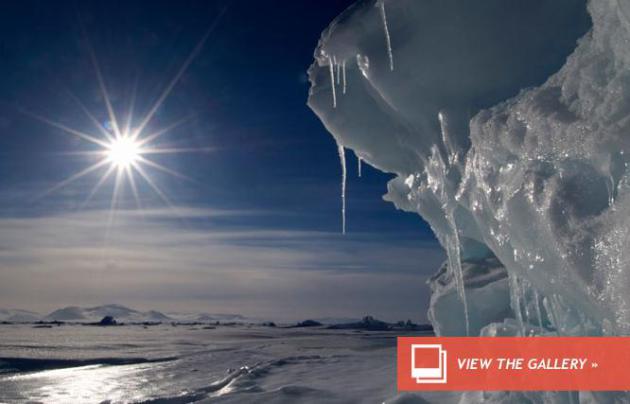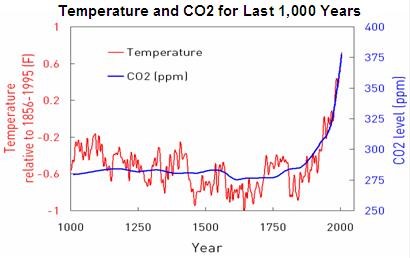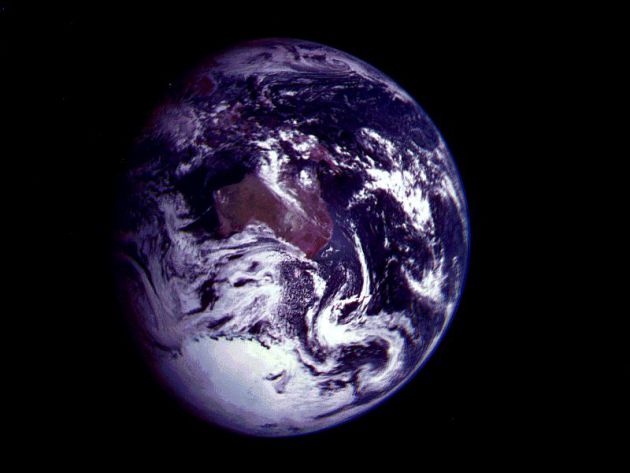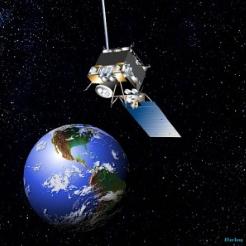Mental Health Alert
If this keeps up much longer the 7-Day Outlook
may come with a warning label. According to Pete Boulay, at the State
Climate Office, the record for latest 60F high in the Twin Cities is
April 26, 1904.
Looking at how our weather is stuck in an unseasonably
cold rut, we may just break that record.
According to Dr. Abraham Verjovsky at
Premiere Psychiatric Medicine
in Edina all of us are being impacted by our sickly spring, to one
degree or another. "Low energy and motivation, anxiety, problems with
sleep, irritability, unexplained aches and pains, we are so familiar
with these" he told me via e-mail. "Patients describe how horrible they
feel, how sick of snow they are, how they don't want to get out of bed,
how depressing, nay, life-draining this weather is". Verjovsky believes
that huge variations from "average weather" afflict most of us with a
mild case of SAD, Seasonal Affective Disorder.
We may see a few 50s the last week of April, but
Mother Nature tests our resolve again next week. A cold rain Sunday
gives way to a rain-snow mix Wednesday night, but the brunt of the storm
stays east of Minnesota. Keep a heavy jacket handy.
This too shall pass - but not soon enough.
Cold Rain. Models show potentially significant rain
late tonight into Sunday, possibly more than .60", mixing with wet snow
over northern Minnesota. Graph: Iowa State.
Chilly, But (Probably) Snow-Free. Kind of sad when
the weatherguy has to include a "no-snow" caveat in the forecast...in
mid-April. A cold rain Sunday gives way to a brief break Monday and
Tuesday, more rain possible midweek, then drying late next week; ECMWF
guidance hinting at 50 (!) a week from tomorrow. High-five.
A Wet Pattern. The 84-hour NAM model shows the next
system pushing in from the west late tonight and Sunday, moving too
quickly to tap much moisture from the Gulf of Mexico. The core of the
jet stream is still 200-400 miles farther south than it should be in
mid-April.
5-Day Rainfall Outlook. The heaviest rains from next
week's storm should pass well south/east of Minnesota, but some .5 to
1" rainfall amounts are expected across Minnesota Sunday; well over 1"
in the Red River Valley (which will not help the flood potential). Map
above: NOAA.
Limping Into Spring. No sudden surges of warmth in
sight (a good thing for the flood potential with all the new snow on the
ground - especially Red River Valley), but GFS data shows low to mid
50s a week from tomorrow, maybe a longer stretch of 50s, even a few 60s,
after April 25. We'll see.
A Backwards Spring. Snowcover was observed over 16%
of the USA (lower 48) as of April 1. As of yesterday snowcover had
increased to 22% What's wrong with that picture? Images: NOAA.
Snowfall And Precipitation Totals Mounting Up. Here's an excerpt from Dr. Mark Seeley's latest edition of
WeatherTalk: "...
This
week's snowfall totals coupled with significant snowfalls over April
6-7 combined to produce some large monthly totals for several climate
stations in the state. In northern areas many have reported over a
foot of snow for the month so far, including Cass Lake, Tower,
Embarrass, Two Harbors, and Babbitt. In many of these areas yet more
snow is expected over the weekend and into early next week. Monthly
total precipitation amounts range over 2 inches already in some southern
communities including New Ulm, Faribault, Blue Earth, Redwood Falls,
Windom, Worthington, Grand Meadow, and Zumbrota. Still others reported
over 3 inches for the month (already a very wet April) including
Waseca, Wells, Amboy, Springfield, Lanesboro, Caledonia, La Crescent,
and Winnebago. The moisture surplus will help to recharge soils,
lakes, and streams, though over two-thirds of the state remains in long
term drought..."
Environment Canada Shrugs Off Winter Weather Riling Canadians. And Minnesotans. Here's an excerpt from
The Windsor Star: "
Canadians
may not agree on much, but today they're coming together with hatred
for two people - old man winter and mother nature. Social media is abuzz
with laments about frigid temperatures, high winds, freezing rain and
even heavy snowfalls that lashed Ontario before moving east. Many of
the western provinces are still buried under several centimetres of
snow. But Environment Canada senior climatologist David Phillips says
Canadians shouldn't be so surprised. He says April is the most
unpredictable stretch of the year, adding most cities report snowfall at
some point during the month. Phillips says Canadians may have been
lulled into a false sense of security based on last year's unusually
warm spring..."
Photo credit above: "
A pedestrian makes their way through
downtown Ottawa on Friday, April 12, 2013., as a major winter storm
blows through the National Capital region." THE CANADIAN PRESS/Sean Kilpatrick
Time Warp. April 12 or February 12? I can't quite
decide. Yesterday's snowy time machine dropped 20"+ from central Wyoming
into western South Dakota, with some 12-15" amounts over southwestern
Minnesota. Map: NOAA.
Before And After. Guess which photo was taken
yesterday. The picture in the upper left was taken April 11, 2012.
Thanks to Tricia Frostad in Chanhassen for reminding us what a
difference a year makes.
"40 Years Of Forecasting - I've Never Seen A Week Like This".
From 20-30 foot swells on Lake Superior and a "Civil Emergency" for
Duluth to shoveling out Target Field, to 20"+ snows in South Dakota and
Wyoming, to wedge tornadoes in Mississippi and record 90-degree heat in
Washington D.C. the weather is reaching a new level of extreme. Here's
my latest
YouTube Climate Matters update, courtesy of WeatherNation TV: "
Incredible
video of a wedge tornado Thursday in Mississippi, A civil emergency
in Duluth, MN thanks to the snow and extreme heat in the Mid-Atlantic.
What kind of weather have you experienced this week?"
Aurora Potential? There has been a significant solar
flare - a CME, and if skies clear the Northern Lights may be very
prominent this weekend. The best chance of partly cloudy skies: Saturday
night, especially east, over Wisconsin. Here are details from
spaceweather.com: "
The magnetic field of sunspot AR1719 erupted on April 11th at 0716 UT, producing an M6-class
solar flare. NASA's Solar Dynamics
Observatory recorded the explosion's
extreme ultraviolet flash. Coronagraph images from the Solar
and Heliospheric Observatory (SOHO) show a CME
emerging from the blast site. The
expanding cloud should hit Earth's
magnetic field during the early hours of April 13th, possibly sparking geomagnetic storms and auroras..."
"Sandy" Retired From List Of Hurricane Names By World Meteorological Organization.
You could certainly see this coming. Any storm that claims considerable
lives is automatically "retired"; details from Reuters and
Huffington Post: "The
World Meteorological Organization has retired "Sandy" from its
rotating list of hurricane names because of the devastation last year's
storm by that name caused in Jamaica, Cuba and the northeastern
United States, forecasters said on Thursday. Atlantic and Pacific
storm names are reused every six years but are retired "if a storm is
so deadly or costly that the future use of the name would be
insensitive or confusing," forecasters at the U.S. National Hurricane
Center in Miami said.
Sandy is the 77th name to be retired from the Atlantic list since 1954. It will be replaced with "Sara" beginning in 2018, when last year's list is repeated..."
Ask Paul. Weather-related Q&A:
Hi Paul,
Good call on the snow totals! Since you are my
weather guru, I'm wondering if you could take a guess at how long this
3-6" in the Twin Cities will stick around? I've seen competing reports
about it being gone by the weekend or sticking around into the middle of
next week. I am a lacrosse coach, and would like to plan if we will
have to be indoors still by Monday!
Kate Gliske
Karen - most of the snow in the east metro will
be gone by Saturday afternoon; it may take a little longer over the west
metro, where there is 4-7" on the ground. Rain will accelerate snow
melt Sunday, but most lawns in the western suburbs probably won't be
snow-free until Monday afternoon. The sun angle is too high for snow to
linger for long.
Dear Paul-
Just wanted to let you know that there are many
children who are seriously disappointed they didn't cancel school. They
were all betting on a snow day.
Keep up the good work.
Rod Meyer
Thanks Rod - I'm surprised that more schools
didn't cancel or postpone classes Thursday. Roads were terrible,
temperatures just below freezing combined with sleet, freezing rain to
put down a layer of rutted ice beneath the snow. When is the last time
we had a snow day in April? Probably not since 1983, when 21.8" fell.
High-Speed Camera System Catches Close-Ups of Snowflakes In Mid-Air.
Gizmag has the details, and some amazing photos: "
Falling
snow can play havoc with radar systems, so the more that we know about
the manner in which snow falls, the better that those systems can be
equipped to compensate for it. That’s why for the past three years,
researchers from the University of Utah have been developing a device
known as the Multi-Angle Snowflake Camera – or MASC. Using three cameras
and two motion sensors, it captures 3D photos of snowflakes in
free-fall..."
Photo credit above: "
The Multi-Angle Snowflake Camera, or MASC, is able to capture 3D photos of individual snowflakes in free-fall."
* family of snowmen above courtesy of Susan Marmot.
Climate Stories...
Climate Change Seen Leaving Arctic Ice-Free By 2050.
Bloomberg has the story - here's a snippet: "
The
Earth’s northern polar region will be almost ice-free in the warmest
months by 2050, sooner than previously estimated, according to a study
by two federal government scientists who work on climate change. The
researchers from the National Oceanic and Atmospheric Administration used three separate methods to predict the sea- ice trends in the Arctic Ocean,
and their estimates for 2020 to 2060 forecast elimination of most ice
during the Northern Hemisphere’s warmest months, according to a statement.
The results show “very likely timing for future sea ice loss to the
first half of the 21st century, with a possibility of major loss within
a decade or two,” according to the paper
by James Overland and Muyin Wang, who both study climate change and
the Arctic. The paper was reviewed by other scientists and accepted for
publication in Geophysical Research Letters..."
Has Obama Already Given Up On Climate Change? Here's an excerpt from an article at
The New Yorker: "
Like
the 2009 document, the new budget is more or less the prose version of
Obama’s campaign poetry. But the second Big Bang also represents a major
dodge on climate change. Over the last two years, Obama has
consistently talked about his second term as the time when he would
forcefully confront the challenges of a warming planet. As I reported last year,
in private conversations he has told people that dealing with climate
change is one of the few ways that he believes he could fundamentally
improve the world decades after he’s gone from office. In his three most
important speeches of the last year, he promised to confront this
threat. In his convention speech in Charlotte, North Carolina, last
September, he vowed, “my plan will continue to reduce the carbon
pollution that is heating our planet, because climate change is not a
hoax. More droughts and floods and wildfires are not a joke. They are a
threat to our children’s future,,.”
Drought Study Misses Underlying Climate Connections. The story from Climate Nexus and
Climate Science Watch: "
In a new report,
Martin Hoerling and his team of NOAA researchers investigated the
underlying causes of the devastating (and still ongoing) drought of 2012
using computer modeling. The report provides a valuable contribution
to understanding the immediate factors driving the occurrence of
droughts but misses the underlying ways in which global warming makes
drought conditions more likely and more severe. It also ignores two key
science developments: the link between climate change and new jet
stream patterns that affect drought in the U.S. and elsewhere and new
research indicating that climate-drought links will show up sooner in
regions of the U.S. outside the focus of Hoerling’s team...."
New Study Shows Once Again How "Climategate" E-mails Were Distorted.
Media Matters has the story - here's the intro: "
At
the height of the manufactured "Climategate" controversy, distortions
of an email from a top climate scientist made it all the way to one of
the leading Sunday shows. But a recent study re-confirms what that
scientist was actually saying -- that much of recent heat has been
trapped deep in the ocean. In 2009, a batch of emails was stolen from the University of East Anglia. In one of the emails, which skeptics quickly took out of context,
Kevin Trenberth, a scientist at the National Center for Atmospheric
Research, lamented the "travesty" that "we can't account for the lack of
warming at the moment." Trenberth was actuallyreferring
to gaps in our "observing system" that make it difficult to say where
short-term energy -- or heat -- is going, not copping to a lack of
long-term climate change, as some claimed. In the email, Trenberth alluded to research suggesting that the "missing" heat might be sequestered deep in the ocean. .."
Martin Luther King And The Call To Direct Action On Climate. Here's an excerpt from
The Miami Herald: "...
We
think there has been far too little direct action, given the
staggering scale of the threat. As the International Energy Agency has
explained, we must leave the vast majority of fossil fuels in the ground
if we are to preserve a livable climate and avoid levels of warming
that "even school children know" will be catastrophic for us all. The
tar sands would be near the top of any list of the largest, dirtiest
pools of carbon that must be forsaken for the sake of humanity. King
explained in his letter, "In any nonviolent campaign there are four
basic steps: collection of the facts to determine whether injustices
exist; negotiation; self purification; and direct action." Has there
ever been a problem where more facts from more unimpeachable sources
have been collected and ignored than climate change? Every major
scientific body and international group has taken to begging and
pleading for action..."
Read more here: http://www.miamiherald.com/2013/04/11/v-print/3337318/martin-luther-king-and-the-call.html#storylink=cpy
Climate Change Brings Stormier Weather To The U.S. No kidding. There's mounting evidence that this is not just our imagination; here's an excerpt from a story at
Nature: "...
At
the EGU meeting, Eberhard Faust, head of climate risk and natural
hazards research at the reinsurance company Munich Re in Germany,
presented a study showing in the US, the annual economic losses from
sizable thunderstorms — those that cause more than $250 million in
damages — have doubled since 1970. His team also found that storms have
become more unpredictable. From 1990 to 2009, years with exceptionally
large storm activity and high losses alternated frequently with
relatively calm years. Year-to-year variation and average losses were
significantly higher than they were between 1970 and 1989..."
Think The Planet Isn't Warming? Check The Ocean.
Climate scientists estimate that 90-93% of all warming is going into the
world's oceans - the rest is heating up the air and melting ice. Here's
an excerpt from
Discovery News: "
A recent article
in The Economist stated that “over the past 15 years air temperatures
at the Earth’s surface have been flat while greenhouse-gas emissions
have continued to soar.” The Economist went to great lengths to point
out that “the mismatch between rising greenhouse-gas emissions and
not-rising temperatures … does not mean global warming is a delusion.”
But the piece was predictably lauded by climate skeptics
as “further evidence” of the case against climate change. Except that …
it wasn’t. As The Economist piece itself pointed out, this wasn’t an
argument that “global warming has ‘stopped.‘” The past two decades have been the hottest in recorded history; of the nine hottest years on record, eight have come since 2000.
The question, though, is why the year-on-year/decade-on-decade
increase appears to have been somewhat less in the past 10 to 15 years,
given the ongoing increase in atmospheric greenhouse gas
concentrations..."
What Is Climate Sensitivity, Why Does It Matter And Who's Got What Wrong and Why?
Perpetual climate deniers like to point out that Earth's climate isn't
nearly as sensitive to man-made greenhouse gases as all those
"alarmist/warmist" scientists claim. Here is a good explanation of
climate sensitivity from climate scientist and Minnesota native Greg
Laden at
scienceblogs.com: "
Climate
sensitivity is the number of degrees C that the earth’s average
temperature (of the atmosphere air and water on top of the “earth” per
se) will increase with a doubling of “pre-industrial CO2″ in the
environment. This is an important number … and it is a number, and to
save you the suspense, the number is about 3 … because it tells us what
the direct effects of the release of fossil Carbon (mainly in the form
of CO2) from the burning of fossil fuels would be. Here’s the thing.
Climate change denialists would like the number to be 1, or some other
number lower than 3. Well, we would ALL like the number to be low, but
those of us interesting in actual science and truth and such things
mainly want to have a good estimate of this important value. Climate
change denialists want to pretend that the number is lower than it is,
regardless of what that number may be..."
Companies Unite In Call For U.S. Climate Change Policy.
Huffington Post has the article; here's an excerpt: "
Leaders
from the business community made one thing clear when they came
together on Wednesday to announce a 100-day corporate campaign in
support of climate change policy: This is not a right or left issue. It
is not about appealing to a base of liberals or conservatives.
According to signers of the campaign, it is about tackling one of the
greatest economic challenges and opportunities of the 21st century. "The
longer we wait, the higher the risks will be to our business, to our
consumers and to society as a whole," said Betsy Blaisdell, Senior
Manager of Environmental Stewardship at Timberland. "We're motivated to
see progress made on the issue of climate change, and it will take
everyone to get it done..."
White House Budget Funds Gore Climate Change Satellite. Details from
The Hill; here's the intro: "
President
Obama’s fiscal 2014 budget calls for using a satellite designed to
track climate change that was originally pushed by former Vice
President Gore. Gore proposed the satellite in 1998 as a way to take
continuous photographs of the Earth, giving scientists measurements of
climate change. Former President George W. Bush never pursued the plan...." From AP: "
Acting
NOAA chief Kathryn Sullivan said its main mission will to give Earth
warning when solar storms — which can zap power systems on the ground
and fry satellite electronics — are on the way. That job is now being
done by a NASA satellite that has surpassed its scheduled lifetime, she
said..."

